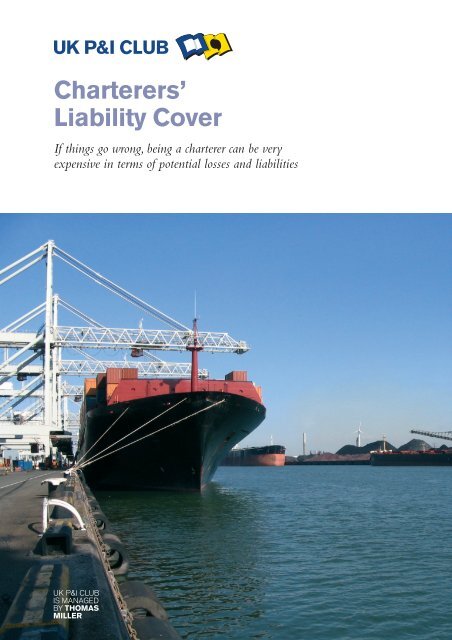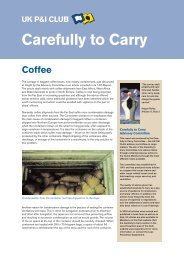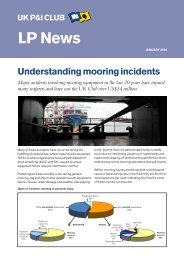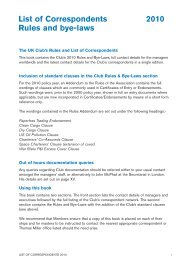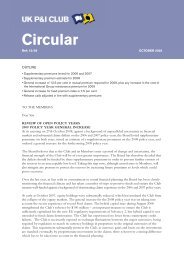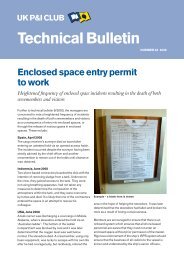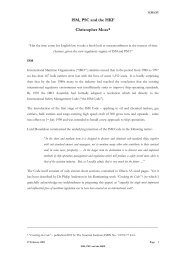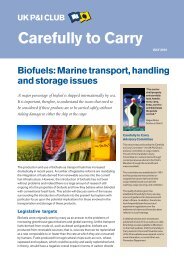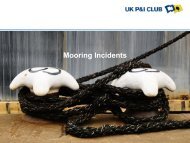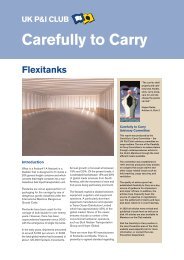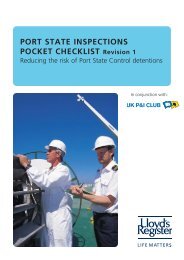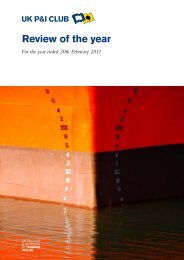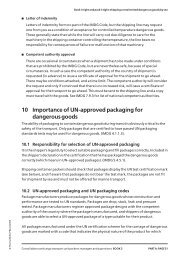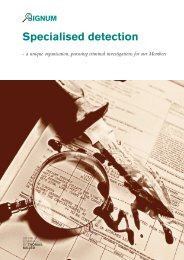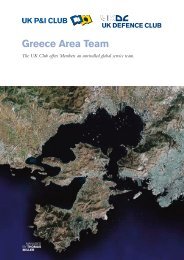Charterers' Liability Cover - UK P&I
Charterers' Liability Cover - UK P&I
Charterers' Liability Cover - UK P&I
You also want an ePaper? Increase the reach of your titles
YUMPU automatically turns print PDFs into web optimized ePapers that Google loves.
Charterers’<br />
<strong>Liability</strong> <strong>Cover</strong><br />
If things go wrong, being a charterer can be very<br />
expensive in terms of potential losses and liabilities
2<br />
Charterers’ <strong>Liability</strong> <strong>Cover</strong><br />
Risk is increasing, and not only because of aggregations of value carried<br />
on ever larger ships, and increasing commodity prices.<br />
The regulatory environment underpins claims<br />
inflation and will look at all connected parties in<br />
the event of a serious shipping accident, not just<br />
the shipowner.<br />
You may be a slot, space, voyage or time charterer.<br />
You may be a traditional chart-erer with a ship<br />
operating background, or a trading company moving<br />
raw materials or finished product, or a trader buying<br />
and selling on a scale that requires chartering.<br />
Whichever you are, you will find what you need<br />
in <strong>UK</strong> Club’s Charterers’ <strong>Liability</strong> <strong>Cover</strong> facility,<br />
which can be adapted to meet your exact needs.<br />
You certainly need insurance. It may be that the<br />
traditional product meets your needs well – and it<br />
remains available. However, increasingly charterers<br />
are seeking something specifically tailored to their<br />
particular situation – in which case the flexibility<br />
of our new product can provide what you need.<br />
• Tailored package of cover and premium<br />
• Integrates with hull and other covers<br />
• Pure liability protection for non-operational<br />
charterers<br />
• Pollution liability without sub-limit<br />
• Most extensive network support<br />
• Minimise delay due to arrest/detention<br />
• Responds to continual changes in charter fleet<br />
• Minimises administrative burden<br />
Why a <strong>UK</strong> Club cover?<br />
Financial security and service are the twin pillars upon which the <strong>UK</strong><br />
Club bases all its activities. The cover and service provided to the<br />
charterer member is no exception.<br />
The <strong>UK</strong> Club’s strength as the world's largest P&I<br />
club enables it to negotiate covers offering greater<br />
scope and limit, and deliver them for a more<br />
competitive and stable price than charterers might<br />
achieve individually.<br />
The resources and economies of scale that the <strong>UK</strong><br />
Club enjoys as the world’s largest mutual P&I<br />
insurer confer considerable benefits on its owned<br />
and chartered Members including:<br />
Claims<br />
As a mutual, the Club takes a positive, co-operative<br />
attitude towards its Members’ claims. The wide<br />
spread of international offices and staff makes it<br />
sensitive to the needs of different regional and<br />
trade areas.<br />
Genuine 24 hours claims handling response<br />
The <strong>UK</strong> Club possesses the largest international<br />
office network in the P&I industry. Offices in<br />
New Jersey, San Francisco, London, Piraeus,<br />
Singapore, Hong Kong, Beijing, Shanghai and<br />
Tokyo are manned by dedicated <strong>UK</strong> Club service<br />
teams. Recruited from a variety of operational,<br />
legal and technical backgrounds, they combine<br />
in-depth expertise with awareness of commercial<br />
realities – to advise on shipping, liability and<br />
insurance issues.<br />
An unrivalled online claims support service<br />
Innovative web-based technology, including our<br />
“ClaimsTrac” system, allows you to access and<br />
analyse your claims data and loss record at your<br />
convenience – day or night.<br />
Commercial underwriting<br />
The <strong>UK</strong> P&I Club takes a flexible, individual<br />
approach to cover for all Members. Many of its<br />
underwriters have been longstanding specialists in
3<br />
particular sectors or geographical regions.<br />
Financial security<br />
The <strong>UK</strong> Club’s considerable reserves, prudent<br />
reserving policy and comprehensive reinsurance<br />
protection provide great financial security. The<br />
Club has maintained a Standard and Poors rating<br />
at the highest level of any P&I club since that<br />
agency began reporting on the mutual P&I<br />
industry.<br />
Flexible and innovative service<br />
The <strong>UK</strong> P&I Club continues to pioneer many<br />
new service initiatives such as its “value for<br />
money” system, managing the performance and<br />
costs of all parties in the claims process. Increased<br />
recent exposure of ship operators to criminal<br />
liability and media attention has been met with<br />
more developed specialist expertise and<br />
relationships with the relevant agencies.<br />
Loss prevention and advice<br />
The <strong>UK</strong> P&I Club is committed to safety. Its<br />
high-level loss prevention programme – the most<br />
extensive in the industry – aims to offset rising<br />
claims and maintain quality amongst Members.<br />
Flexible Charterers’ P&I <strong>Cover</strong><br />
<strong>UK</strong> Club charterers’ liability insurance provides<br />
the benefit of access to the broad cover described<br />
within the Club’s Rules. However, the unique<br />
position of the charterer in the maritime industry<br />
requires an enhanced and tailored cover to ensure<br />
that those exposures which go beyond those of the<br />
conventional owner-operator are addressed and<br />
financially secured.<br />
Comprehensive cover with high limits at a<br />
competitive prices<br />
The flexible charterers’ cover offers variable limits<br />
of cover up to US$750 million any one accident<br />
or occurrence.<br />
No sub-limit for pollution<br />
There are no sub-limits imposed below the overall<br />
agreed limit of the cover for either pollution risks<br />
or other exposures arising from the ship owners<br />
limitation clause.<br />
Integrates with hull and other covers<br />
The flexible charterers cover is designed to be<br />
combined with the Damage to Hull cover as well<br />
as other risks (see below)<br />
Pollution liability cover for charterer’s<br />
own cargo<br />
<strong>Cover</strong> can be extended to include cargo owner’s<br />
pollution liability where the charterer or an<br />
affiliated/associated company is also the cargo owner.<br />
Pure liability protection for non-operational<br />
charterers<br />
<strong>Cover</strong> can also be extended to include the<br />
Members’ legal liability as cargo owners and/or<br />
shippers where no charterers interest in the<br />
carrying vessel exists.<br />
Flexible range of additional tailored covers<br />
Many operators require additional specialist risks<br />
to be included to reflect the particular hazards<br />
faced by their sector or trading pattern. A review<br />
of some of the key additional covers can be found<br />
on the back page of this brochure.<br />
Damage to Hull<br />
All risks cover for charterers’ ships<br />
<strong>Cover</strong> extends to include financial loss, liability,<br />
costs or expenses arising as a direct consequence of<br />
loss of, or damage to, the entered ship.<br />
Associated costs and expenses<br />
Sue and labour and legal costs in accordance with<br />
the cover provided under the flexible charterers<br />
liability cover.<br />
General average and salvage exposure<br />
<strong>Cover</strong> includes the charterer’s general average and<br />
salvage contributions and salvage charges in<br />
respect of loss of or damage to the entered ship,<br />
charterer’s bunkers on board and the freight at risk<br />
in relation to the ship.<br />
High limits of cover<br />
The flexible charterers’ cover offers variable limits<br />
of cover up to US$750 million on any one<br />
accident or occurrence. To obtain the full limit of<br />
US$750 million, cover must be purchased on a<br />
combined basis.<br />
War Risks<br />
Standard cover includes War Risks on a worldwide<br />
trading basis.<br />
Additional covers<br />
A charterer often requires protection for loss of or<br />
damage to his bunkers arising from an incident<br />
involving his ship (see back page for additional<br />
covers).
4<br />
What are the key charterers’ risks?<br />
Dr Chao Wu, Legal Director of Thomas Miller P&I Ltd explains the<br />
key risks to which a charterer is most commonly exposed and for which<br />
cover is available.<br />
P&I<br />
A charterer needs standard P&I cover under the<br />
Rules for the same risks as are usually insured by<br />
an owner – and will therefore have cover for his<br />
direct liabilities to third parties in respect of risks<br />
set out in Rule 2. A charterer may need to widen<br />
the scope of cover for direct liabilities if he agrees<br />
to take on contractual risks that would not fall to<br />
him as a matter of law (I).<br />
However, a Charterer also needs cover for liability<br />
to indemnify the owner for such risks, set out in<br />
Rule 2 (II).<br />
Let us look at each in turn.<br />
Charterer’s direct liability to<br />
third parties<br />
This can arise either in contract or in tort, as in<br />
the examples below.<br />
Cargo<br />
A charterer will be liable directly to the owner of<br />
damaged or lost cargo when he is the carrier<br />
under his own bill of lading, or, as may happen in<br />
some jurisdictions, if he is considered to be the<br />
carrier under an owner’s bill of lading. Less<br />
commonly, a charterer may face a claim in tort<br />
where the carriage contract is with the shipowner,<br />
especially if the claim is unsecured and the<br />
prospects of recovery from the owner are<br />
uncertain.<br />
Extended Cargo <strong>Cover</strong><br />
A charterer may need an extension to the scope of<br />
his direct P&I cover. He may for example enter<br />
into cargo service contracts that are more onerous<br />
than the Club’s standard terms, Hague-Visby. He<br />
may need cover for geographical or contractual<br />
deviations, such as dry docking with cargo on board.<br />
This extended scope of P&I can also respond to<br />
claims arising from the delivery of cargo without<br />
the production of an original bill of lading provided<br />
the charterer has taken a letter of indemnity on<br />
the standard form of wording recommended by<br />
the International Group. The policy can also cover<br />
claims arising from delivery at a port other than<br />
that mentioned in the bill of lading, ad valorem<br />
bills of lading, rare and valuable cargo, and<br />
liabilities arising from unreasonable periods of<br />
storage. There is a US$50 million limit on cover<br />
although more is available if required. The policy<br />
excludes inherent vice, delay and loss of market.<br />
This extended cargo cover is of course not just<br />
available to charterers but is also available to ship<br />
owner Members.<br />
Pollution<br />
In certain jurisdictions e.g. California, Alaska &<br />
Japan, a charterer can incur direct and even strict<br />
liability for pollution caused by the ship. This may<br />
arise in a variety of ways.<br />
First, by force of law due to the vessel’s operations.<br />
For instance, in the United States Oil Pollution<br />
Act 1990 (OPA 90) provides that “any person<br />
owning, operating or demise chartering the vessel”<br />
may be liable. Although under OPA 90 it seems<br />
that a time charterer is only liable if considered to<br />
be the operator of the vessel as well, the individual<br />
states in the US have been able to enact their own<br />
legislation and most states target, “transporter of<br />
oil”, “person having control over oil”, “person<br />
taking responsibility” so that a time charterer can<br />
be at risk. Additionally, in some states such as<br />
Alaska, strict liability for pollution is also imposed<br />
on cargo interests, so that a charterer who owns<br />
cargo attracts liability through that route.<br />
Third Parties<br />
A charterer may incur liability directly to a<br />
stevedore, or any third party, who suffers personal<br />
injury or property damage as a result of the<br />
charterer’s negligence. How might such claims<br />
arise against the charterer? One example would be<br />
the improper description of noxious cargo,<br />
resulting in injury being caused to an unprotected<br />
stevedore. Another would be a negligent order<br />
resulting in injury to a longshoreman. In some US<br />
circuits, the NYPE clause 8 has been held to shift
5<br />
responsibility for negligence, during loading/<br />
discharging from the owner to the charterer.<br />
Fines<br />
A charterer, if falling into the definition of<br />
“carrier”, can be subject to fines e.g. if in noncompliance<br />
with the US “Automated Manifest<br />
System” Regulations (see Club Circular Ref<br />
10/04). Guidance by the US Customs & Border<br />
Patrol (CBP) advised that it views the carrier as<br />
the entity that “controls” the vessel which includes:<br />
(a) determining ports of call; (b) controlling<br />
loading and discharging cargo; (c) knowledge of<br />
cargo information; (d) issuing of bills of lading; and<br />
(e) the entity which has typically provided the CF<br />
1302 cargo declaration or the cargo information<br />
to prepare the CF 1302 to the vessel agent.<br />
Indemnification of owners<br />
A charterer will have an obligation to indemnify<br />
the owner for third party liability where this<br />
results from a breach of the charterparty by the<br />
charterer, or arises out of activities which are the<br />
charterer’s responsibility.<br />
Typical examples of situations where charterers<br />
may have to indemnify owners for P&I liability<br />
include the following.<br />
Unsafe port<br />
Most charterparties have a safe port or berth<br />
warranty. Sending the ship to an unsafe port in<br />
breach of that warranty could result in P&I<br />
liabilities such as cargo loss or damage, personal<br />
injury, pollution, or even wreck removal.<br />
Crew<br />
A charterer will rarely be liable for the owner’s<br />
crew, but may be responsible to indemnify the<br />
owner for liabilities towards stevedores and other<br />
such personnel.<br />
Dangerous goods<br />
The charterer will be liable to indemnify the<br />
owner for any property damage or personal injury<br />
arising from loading or carriage of dangerous<br />
cargo. If, as happens with increasing frequency,<br />
such cargo has not been properly declared by the<br />
shipper, the charterer will nevertheless remain<br />
liable to the owner for the consequences. Such<br />
consequences can be severe and can extend to<br />
cargo damage, death or personal injury, pollution,<br />
or wreck removal.<br />
Stowage incidents<br />
Under the unamended NYPE clause 8, the<br />
charterer is responsible for loading, stowage, etc. If<br />
as a result of a collapse of stow due to bad stowage,<br />
property damage or personal injury is caused, the<br />
charterer will be liable to indemnify the owner for<br />
such damage or injury.<br />
Bunker quality<br />
In most time charterparties, the charterer should<br />
supply bunkers to the vessel meeting agreed<br />
specifications. He will have to indemnify the<br />
owner for any damages resulting from the supply<br />
of off-specification bunkers.
6<br />
Stevedores<br />
<strong>Liability</strong> for damage caused to the ship by<br />
stevedores. Most time charters, particularly in the<br />
bulk and general cargo trades, have a stevedore<br />
damage clause, which will make the charterer<br />
liable, in certain circumstances, for stevedore<br />
damage.<br />
Safe port<br />
<strong>Liability</strong> for damage to the ship arising from the<br />
failure to provide a safe port or berth.<br />
Marpol Annex VI has introduced restrictions on<br />
the sulphur content of fuel. As a result, a charterer<br />
will now have to supply bunkers not only of a<br />
quality to meet charterparty specifications, but also<br />
to enable the vessel to meet particular port<br />
requirements depending on whether or not the<br />
state has ratified Annex VI. Failure to do so may<br />
result in the charterer having to indemnify the<br />
owner for any resulting loss or liability – which<br />
could include liability for fines.<br />
Poor stowage<br />
Damage to the ship resulting from stowage<br />
contrary to the terms of the charter party, where<br />
the charterer is responsible for loading and<br />
stowage of cargo.<br />
Hazardous or dangerous cargo<br />
Damage to the ship caused by the nature of the<br />
cargo itself, such as where cargoes are corrosive or<br />
explosive.<br />
For example, BIMCO’s “Fuel Sulphur Content<br />
Clause for Time Charter Parties” provides for the<br />
charterer to indemnify the owner for loss or<br />
liability arising from a failure to “permit the Vessel,<br />
at all times, to meet the maximum sulphur content<br />
requirements of any emission control zone when<br />
the Vessel is trading within that zone.”<br />
Pollution<br />
Although most states outside the USA are party to<br />
the CLC (Civil <strong>Liability</strong> Convention) under<br />
which tanker pollution claims are channeled solely<br />
to the registered shipowner, if the cause of the<br />
pollution is something for which the charterer is<br />
responsible (such as in an unsafe port situation)<br />
then the charterer may be obliged to indemnify<br />
the shipowner.<br />
Damage to Hull<br />
The standard P&I cover that is provided to<br />
shipowners excludes cover for damage to the<br />
entered ship. However, for the charterer, such<br />
cover can be important because of the variety of<br />
ways in which a charterer may become liable for<br />
damage to a ship. Many of the above examples of<br />
situations which might give rise to traditional P&I<br />
liabilities are also situations where the chartered<br />
ship may be damaged and the costs thereof may be<br />
recoverable from the charterer.<br />
Bunker quality<br />
Damage to ship’s engines if inferior bunkers have<br />
been provided by the charterer. Off-spec bunkers<br />
can cause damage to the ship’s main and auxiliary<br />
engines, aside from many other difficulties such as<br />
that of finding a place to discharge off-spec fuel,<br />
diverting for new bunkers, and losses resulting<br />
from slow speeding where this is necessary.<br />
General average and salvage liability<br />
General average and salvage contributions in respect<br />
of loss or damage to the ship, Member’s freight at<br />
risk or Member’s bunkers on board the ship.
7<br />
FD&D risks<br />
As a charterer enjoying the<br />
benefits of our flexible cover, you<br />
will get the legal costs of dealing<br />
with any P&I claim included as<br />
part of the package. However,<br />
many charterers will prefer the<br />
added security of cover for freight,<br />
delay and demurrage risks<br />
(FD&D risks).<br />
The additional step of purchasing a cover from the<br />
<strong>UK</strong> Defence Club provides protection for legal<br />
and other costs of resolving a wide range of<br />
disputes about uninsured matters. These include<br />
disputes under charterparties on matters such as<br />
off hire, bunker quality, speed and performance,<br />
unsafe port or berth, laytime and demurrage.<br />
• Prompt legal and practical advice on the merits<br />
of cases<br />
• The way cases should be handled and the course<br />
they should follow<br />
• Negotiating with opponents<br />
• Finding the best lawyers and experts for each case<br />
• Clear, practical communication with you, the<br />
lawyers and the experts<br />
• Co-ordination of large cases<br />
• Monitoring of costs and fees<br />
• Advice on drafting documentation<br />
The <strong>UK</strong> Defence Club is the largest organisation<br />
of its kind and has access to the same international<br />
network of correspondents, lawyers and other<br />
experts as are used by <strong>UK</strong> P&I. The same <strong>UK</strong> P&I<br />
Club underwriting contact that provides your<br />
charterers P&I and hull risks is also able to arrange<br />
an entry with the Defence Club to protect this<br />
other important aspect of your exposure. <br />
In addition to providing cover, the Defence Club<br />
and its managers offer advice on:<br />
Keeping ships on the move<br />
The <strong>UK</strong> Club provides insurance to around 5,000 charter entries every<br />
year. These entries have generated an average of 1,700 claims each year,<br />
which represents a considerable fund of expertise in this specialist area.<br />
The <strong>UK</strong> Club’s network of offices in Europe,<br />
Asia-Pacific and the Americas are well placed to<br />
support them. In turn, that network can call on<br />
the Club’s correspon-dency network of some 350<br />
legal, commercial and technical specialists for local<br />
support in the handling of claims.<br />
development of streamlined declaration systems to<br />
minimise the administrative burden of obtaining<br />
cover for a continually changing charter fleet. <br />
As well as direct problem solving expertise, they<br />
provide the essential support and guarantee systems<br />
that enable a ship to sail with minimum delay in<br />
the event of arrest or other legal detentions.<br />
Minimising delay means minimising costs.<br />
The <strong>UK</strong> P&I Club recognises that ease of use is<br />
essential for any charterers’ package. The volume of<br />
charter business handled by the Club has led to the
8<br />
Flexible options<br />
Charterers’ Bunkers<br />
As a charterer you risk sustaining your own losses<br />
where an accident is serious enough to cause loss<br />
of the ships bunkers. You may therefore want to<br />
include in your cover protection for loss of or<br />
damage to charterers’ bunkers reasonably attributable<br />
to fire or explosion, stranding, grounding, sinking<br />
or capsizing of the entered ship, or to collision of<br />
the entered ship with any external object.<br />
This cover is based on Institute clauses including<br />
the relevant Wars and Strikes Clauses and available<br />
up to a limit of US$2 million any accident or<br />
occurrence.<br />
Charterers’ Freight<br />
This cover is provided under the Institute Time or<br />
Voyage Clauses Freight (1.11.95) for up to US$5<br />
million any one accident or occurrence. <strong>Cover</strong> can<br />
be obtained for all risks or as total loss only, but<br />
including salvage charges and sue and labour.<br />
Blocking and Trapping<br />
If a charterer should be caught by a closure or<br />
restriction of navigation within his declared<br />
trading area, the daily time charter hire payments<br />
can be recovered under this cover.<br />
Passenger Ships Special Risks<br />
The cover available to owner Members in respect<br />
of additional risks arising from passenger can<br />
also be included in a charterer’s package.<br />
Such risks include loss of effects, liabilities to<br />
passengers arising away from the ship such as<br />
additional compensation and legal costs.<br />
Further information on special passenger<br />
related risks can be obtained from your normal<br />
underwriting contact.<br />
Causes of such delay or detention can include<br />
breakdown of locks or seaway equipment,<br />
blockage by sunken or stranded objects or ice, and<br />
strikes or stoppages by any personnel essential to<br />
the transit of a seaway. The cover can also be<br />
extended to include additional expenses incurred<br />
in re-routing ships to avoid such a delay.<br />
Further assistance<br />
The <strong>UK</strong> P&I Club will be pleased to provide you<br />
or your broker with further information on how<br />
the Club’s charterers’ covers can be tailored to the<br />
specific needs of your current charter fleet.<br />
Either you or your broker are welcome to contact<br />
the underwriting department in London directly.<br />
The direct contact details of all individual<br />
underwriters are listed in the “Making Contact”<br />
section of the <strong>UK</strong> P&I Club website –<br />
www.ukpandi.com. That website enables you to<br />
identify the individual underwriter specialising in<br />
your particular area.<br />
The underwriting department can be contacted by<br />
fax at +44 20 7621 9761 or by email at<br />
underwriting.ukclub@thomasmiller.com.<br />
Alternatively, the Club’s managers and agents can<br />
be contacted at the numbers provided at the foot<br />
of this brochure for more information.<br />
If you require more general information on the<br />
<strong>UK</strong> P&I Club, the Club’s marketing department<br />
would welcome your enquiry. Contact Nick<br />
Whitear (nick.whitear@thomasmiller.com) or<br />
Jenny Whitehead<br />
(jenny.whitehead@thomasmiller.com).<br />
Alternatively, the <strong>UK</strong> Club website is an<br />
exhaustive source of information on the Club and<br />
P&I issues in general.<br />
For more information, please contact:<br />
Thomas Miller P&I Ltd – London<br />
Tel: +44 20 7283 4646 Fax: +44 20 7283 5614<br />
Thomas Miller (Hellas) Ltd – Piraeus H1<br />
Tel: +30 210 42 91 200 Fax: +30 210 42 91 207/8<br />
Thomas Miller (Americas) Inc – New Jersey<br />
Tel: +1 201 557 7300 Fax: +1 201 946 0167<br />
Thomas Miller (Hong Kong) Ltd – Hong Kong<br />
Tel: + 852 2832 9301 Fax: + 852 2574 5025<br />
www.ukpandi.com


